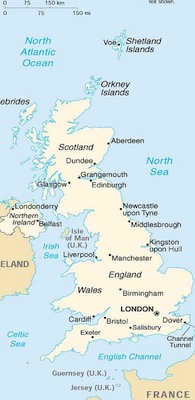After hours of counting in a razor-tight race, the results of the British referendum are in, and the kingdom will be leaving the European Union. Final numbers are still coming in, but British outlets have called the race in favor of the “Brexit” movement, with the margin expected to be around one million votes. The race was called around 11:40 PM eastern.
 Voting saw overwhelming support to remain in the EU in Scotland and Northern Ireland, as well as Gibraltar, along with the area around London. The rest of England, however, was strongly in favor of leaving, and that was ultimately the difference.
Voting saw overwhelming support to remain in the EU in Scotland and Northern Ireland, as well as Gibraltar, along with the area around London. The rest of England, however, was strongly in favor of leaving, and that was ultimately the difference.
UKIP Leader Nigel Farage declared it a victory for “real people.” The results were something of a surprise, as financial markets were trading heavily toward the “remain” vote. The British pound began slumping at the news, quickly touching a 30-year low. The FTSE 100 was down some 7% in early trading, and the drop threatens to wipe out upwards of 100 billion pounds in the days to come. Asian markets were also strongly down on the news, with investors fearing uncertainty. Perhaps the biggest down market, however, was in Germany, where the DAX was down in the realm of 10%, over fears that Europe’s unity is weakening. While the US dollar was up sharply, early Dow futures were down significantly, suggesting it’s going to be a rough Friday worldwide.
Politically, this is already fueling further calls for Prime Minister David Cameron to resign, though Conservative Euroskeptics had issued a statement ahead of the vote urging him to stay regardless of the outcome. Cameron suggested that his withdrawal timetable wasn’t set, but that he intended to be out of office by October.
The overwhelming majority of Scotland being in favor of “remain” is likely to loom large in the future as well, fueling a new push for them to withdraw from Britain and declare independence themselves. A previous Scotland independence vote narrowly failed. Sinn Fein in Northern Ireland is also talking about an independence vote, with an eye on returning to the EU as part of a united Ireland.
Financial analysts were predicting the European Union to take several harsh measures against Britain in the wake of the Brexit, trying to make their departure as financially painful as possible in the hope of deterring any other nations from following them to the exit.
The exact mechanics of the departure from the EU are still unclear, as the union has never had a member decide to leave before. Cameron assured in the hours that followed the vote that there won’t be any immediate status change, and analysts were suggesting that the full extrication from the Union could take years. Cameron added that he is holding off on the formal steps to leave, and intends to leave that to his successor.


